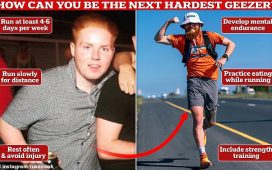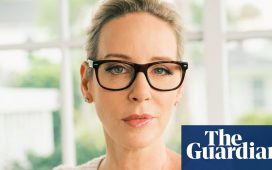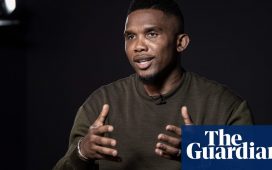It was on Father’s Day, five years ago, that Marvyn Harrison sent a heartfelt message to his friends that would change his life for ever. Back then, his son was three and his daughter was six months old. And he couldn’t seem to help feeling constantly like a fake, an impostor. “I felt like I was being fraudulent,” he says.
He was going through the motions of being a loving dad and a supportive husband, without feeling the intense emotional bond with his children he had always expected to feel. Looking back now, he says, “I didn’t understand how to connect deeper.”
His job in marketing involved working long hours and when he was home, he thought his priority as a father should be to facilitate and support his wife, Nina, in her role as a mother. But at the same time, he felt something was missing from his relationship with his children.
His own father hasn’t been in his life since he was 18 months old – and whenever he saw other dads holding their children, playing games and having fun together, he would think to himself: “I don’t think I’ve had many of those moments.” It all looked so easy, so innate, for the other dads, so he assumed that it must be his fault. “It had to be me. It just had to be.”
This feeling that he alone lacked the ability to feel a deep and meaningful connection with his children had intensified when his daughter, Ocean, was born.
Faced with the challenge of parenting a toddler and a baby, he couldn’t stop seeing himself through the lens of his father’s failure. “I was basing my feelings about being a dad on the experience I had – or the lack of experience I had – with my father. I was almost battling that as a demon. I wanted to be better than him, to be present, active and loving in a way that he wasn’t.”
A week before that life-changing Father’s Day, he remembers trying to look after Blake and Ocean alone, while his wife was resting. “Ocean started crying, so I picked her up and tried to placate her. And that made her cry even more. It was as if she was saying: ‘Get your hands off me, where’s my mother?’”
He felt rejected. “And then her crying alerted Blake and he was like, ‘Yeah, I want my mum, too.’”
Inevitably, the “kerfuffle” woke up his wife. “And I had to give my daughter to her and then my son ran past me and jumped on to her, saying, ‘Yeah! We want Mummy.’”
He felt utterly inadequate. “I thought: ‘I can’t even support my wife when she’s sleeping, because their desire for her is so great.’” He questioned what he was capable of as a father, if he could not even do that. “That really affected me. It didn’t feel good.”
He sat with his feelings for a week and then it was Father’s Day. “But I didn’t feel like celebrating. It didn’t feel like something I should be doing.”
He decided to send a WhatsApp message to the other Black fathers he knew – at the time, a group of 23 people – wishing them a happy Father’s Day, telling them that he saw them as role models. “I wrote: ‘I just want to thank everyone here, because I look to you when I’m thinking about how I parent and I’m finding it really difficult.’”
That was when he discovered that other Black dads were feeling the same. “We were all looking at each other, without knowing.” He opened up more about how he was feeling. “And then everyone started sharing their stories and talking about how we need to celebrate each other more.”
It was the start of a conversation about Black fatherhood that would eventually lead to a global movement. Soon, Black dads from all over the world were joining the WhatsApp group and sharing their own experiences of fatherhood. Harrison realised that many were facing the particular challenges and anxieties, often linked to racism or cultural beliefs, unique to Black fathers – and that they needed a proper platform to support each other.
He launched a (now multiple award-winning) podcast, Dope Black Dads, and with other dads, began to build an online community of the same name.
Today, thousands of Black people around the world use his forum to discuss the highs and lows of male parenting, masculinity and mental health. And this year Harrison has been looking forward to celebrating Father’s Day.
“Now, I feel parenting is my superpower,” he says. “I enjoy it so much.” He reflects on how broken and powerless he felt five years ago and wishes he could tell his younger self that you cannot force a connection with a child. “It naturally happens when you’re putting in the work – and the time.”
His own breakthrough happened when he started practising affirmations with Blake. “I would make him laugh by saying: ‘I am brave.’ And then he would yell it at the top of his voice.”
Spending more time alone with each of his children – talking to them about Arsenal and his other passions, taking them on errands, going for walks and drives together and to playgroups and the cinema – he learned what being a father really meant. “It’s beautiful. But you’ve got to launch yourself into it. You will make mistakes. It won’t be easy. There will be days you don’t sleep. You’ll get thrown up on. You’ll go out somewhere and when you get there, they’ll tell you they want to go home now. All of those things will be character building and you will learn to really love your children.”
Looking back now at his early days as a dad, he wishes he’d had more skin-to-skin contact with his babies, carried them in slings, helped his wife more with the night feeds and talked to them more often about anything – even if it was just what they had for breakfast. “Your voice should be soothing to your child, it should be something that calms them – and so should your smell, your touch. And it all helps you – not just with their connection to you, but with your connection to them.”
Knowing this, he realises now that when his babies needed comforting, “I just never had the tools.”
His own father, after all, wasn’t there to help or guide him. “It wasn’t until I became a dad that I realised how much information I didn’t have. All he’d taught me was who I didn’t want to be.”
Understanding that he could get the support and guidance he needed from his peers, instead, was empowering. He is grateful to his wife for all her patience and support, too, and his children have taught him a lot as well.
Being a loving and present dad, he realises now, is not even that complicated. “It’s just time. It’s just quality time with them, doing anything, watching how they observe the world and who they naturally are when they’re being free.”
It also gets easier as your children get older. “As they became more mobile and more aware of things, I realised I could teach them little things and they would come back to me and want to learn to do stuff.”
One of the reasons he decided to practise affirmations with his children is because he experienced “extreme racism” as a child in Hackney where he was called the N-word and chased down the street. He wants his children to have a positive inner voice and to know what to say to themselves, in their own minds, if they are ever subjected to racism or ridiculed for being different. “Telling my children that they’re beautiful, they’re powerful, they’re loving, they’re kind, is really important, because I don’t think society will ever say that to them.”
Seeing how his children have benefited from saying affirmations, and how confident they have become, he decided to write a children’s picture book that lists them. I Love Me! – featuring illustrations of Blake and Ocean – was published last month and Harrison hopes other Black fathers will use it as a way of connecting with their children.
“The book will do much of the heavy lifting, but to the child, it will feel like you are speaking to them.”
Since he set up Dope Black Dads, his priorities in life have changed. In the past, he would typically work 13- or 14-hour days. “I would just keep going, going, going. But I don’t have the desire to do that any more. I want to be with my children. I want to have experiences with them. I want to take them places. They are the most important people in my life.”
He no longer finds himself wondering what his purpose is, or why we are all here. “I’ve got that glow that I was searching for, that I was missing – and it is really powerful.”
I Love Me! by Marvyn Harrison and illustrated by Diane Ewen (Macmillan, £7.99) is available at guardianbookshop.com for £7.43














